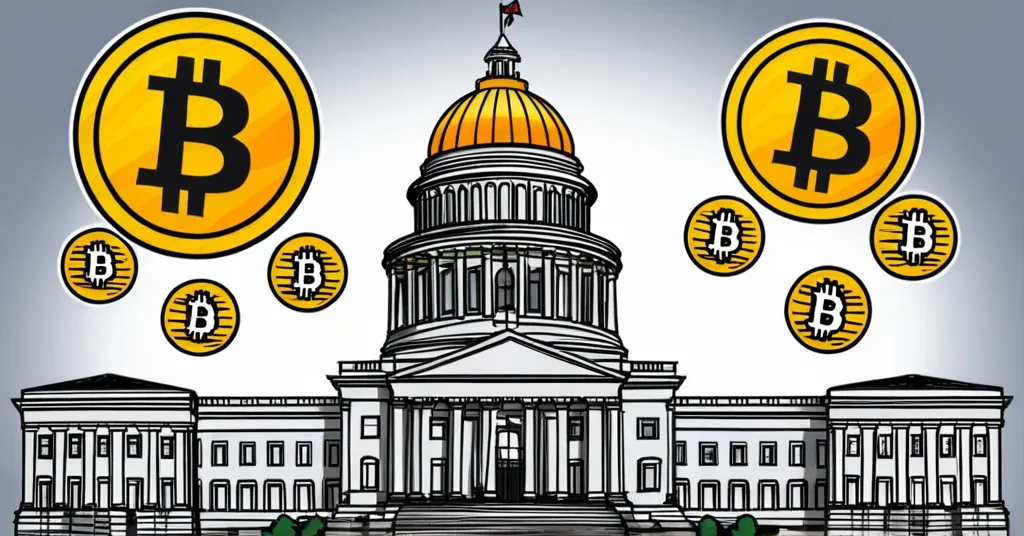New Hampshire Proposes Bitcoin in State Reserves: A Crypto Leap Forward

New Hampshire’s Bitcoin Reserve Proposal: A Bold Leap into Crypto
New Hampshire’s state treasury might soon include Bitcoin in its reserves, thanks to a bill proposed by Representative Keith Ammon. This initiative reflects a growing trend towards recognizing cryptocurrencies as viable financial instruments, with support from notable figures like Donald Trump and Senator Cynthia Lummis.
- New Hampshire’s bill to hold Bitcoin as state savings.
- Secure custody solutions to safeguard Bitcoin holdings.
- Political support from Trump and Lummis for Bitcoin reserves.
- Similar initiatives in other states and countries.
Representative Keith Ammon’s proposed legislation in New Hampshire aims to allow the state’s treasury to hold Bitcoin alongside traditional assets like gold and silver. This move positions New Hampshire as a potential trailblazer in state Bitcoin savings, emphasizing the use of secure custody solutions—specialized services that protect digital assets from theft and loss—to ensure the safety of these digital holdings.
The push for state-controlled Bitcoin reserves isn’t isolated to New Hampshire. Other U.S. states like Texas, Ohio, and at least ten others are mulling over similar bills. This trend is part of a larger movement towards cryptocurrency adoption, driven by state and national governments looking to hedge against inflation and embrace digital currencies.
On the federal level, Senator Cynthia Lummis has vocally supported the idea of a Bitcoin reserve. Her proposal, announced at Bitcoin 2024, includes establishing a decentralized network of secure Bitcoin vaults and a significant purchase program aiming to hold about 5% of the total Bitcoin supply. Lummis argues that this reserve could fortify the U.S. dollar’s global position and address inflation concerns.
Meanwhile, former President Donald Trump has jumped on the crypto bandwagon during his campaign, promising to elevate the United States to a global leader in cryptocurrency. Trump’s pledges include maintaining the government’s existing 207,000 BTC stockpile, firing SEC Chairman Gary Gensler, and ensuring all future Bitcoin is mined in the U.S. His pro-crypto stance reflects a nationalistic approach to cryptocurrency and a desire to leverage Bitcoin for U.S. energy dominance.
Internationally, countries like Brazil and Poland are also exploring the concept of holding Bitcoin in their national treasuries, highlighting the global momentum behind digital currencies. The idea of U.S.-based Bitcoin reserves has been gaining traction since 2024, with expectations that more jurisdictions will adopt similar measures in 2025.
While the enthusiasm for Bitcoin reserves is undeniable, it’s essential to consider the potential pitfalls. Bitcoin’s notorious volatility is a rollercoaster ride no state treasury should take lightly. Moreover, the environmental impact of Bitcoin mining raises significant concerns. Balancing these risks with the promise of a new financial paradigm is crucial as states and nations navigate this uncharted territory.
As a champion of decentralization and disruption, it’s exciting to see politicians finally catching up to the crypto revolution. Yet, we must remain vigilant. Bitcoin’s potential as a store of value and hedge against inflation is compelling, but the journey towards mainstream adoption is fraught with challenges. The path forward must be paved with wisdom, not just enthusiasm.
Key Takeaways and Questions
- What is the proposed bill in New Hampshire about?
The bill proposed by Representative Keith Ammon aims to allow New Hampshire’s treasury to hold Bitcoin as a reserve asset, alongside traditional assets like gold, silver, and platinum.
- What measures does the bill include to ensure the security of the Bitcoin reserve?
The bill includes provisions for “secure custody solutions” to safeguard New Hampshire’s potential Bitcoin stash. These are specialized services that protect digital assets from theft and loss.
- Which other U.S. states are considering similar legislation?
Texas, Ohio, and at least 10 other U.S. states are considering similar legislation to establish Bitcoin reserves.
- Who has advocated for Bitcoin reserves at the federal level?
U.S. Senator Cynthia Lummis has advocated for a Bitcoin reserve at the federal level.
- What role has former President Donald Trump played in the push for Bitcoin reserves?
Former President Donald Trump’s campaign included pledges to make the U.S. a global leader in cryptocurrency and proposed maintaining the government’s existing 207,000 BTC holdings.
- Which countries, other than the U.S., are exploring Bitcoin reserves?
Brazil and Poland have begun exploring the concept of holding Bitcoin in their national treasuries.
- When did the idea of U.S.-based Bitcoin reserves gain momentum?
The concept gained momentum in 2024, with more jurisdictions expected to adopt similar measures in 2025.
As we watch this narrative unfold, the integration of Bitcoin into state and national financial strategies offers both promise and peril. For those of us who champion the disruptive potential of cryptocurrencies, these developments are a testament to Bitcoin’s role in the future of finance. Yet, we must remain critical and vigilant, ensuring that the path forward is navigated with caution and insight.



